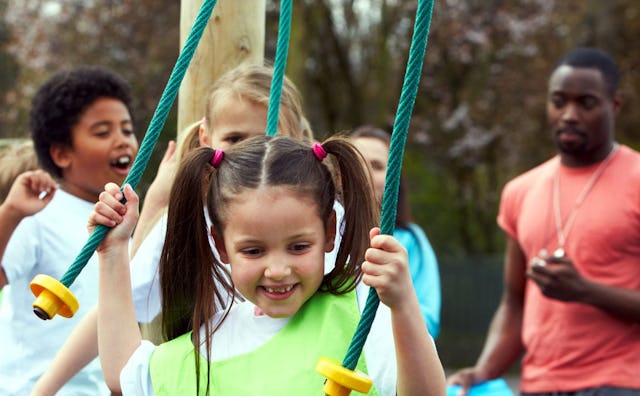How Bold Boys And New Breasts Helped Me Listen To My Daughter Better

On that day, I used my “might be one of the older kids” powers to my advantage, placing myself all up in the mix while hardly being noticeable. Headphones on (playing nothing) and eyes peeled (observing everything), I watched and listened as a boy who looked to be around 12 pointed at my daughter and told his friend—in front of my daughter—that he wanted to have the three-letter word with my child. And in case you missed that, the three-letter word was S-E-X.
Thankfully, my husband and I had already had several talks with our daughters—our youngest was 8 at the time—about sex (the biological aspect) and sexuality (the social stuff). We’re a location-independent, un-schooling family, which basically means we travel regularly and our daughters’ social interactions vary, often including peers who are not in their age group. As such, we find it critical to address life topics from a progressive, open-minded space, instead of relying on school or traditionally age-appropriate time frames for touchy topics.
Even with all those talks, I still completely panicked when I heard the boy’s words! I swear I came this close to morphing into the Jamaican Bruce Lee and executing a precise running dropkick directly into his abdomen. But I didn’t…because there’s prison. And because I (eventually) recognized that moment as an opportunity to observe, rather than to step in. That moment afforded me the valuable benefit of having a real-life experience to draw on as my husband and I continue to nurture confident self-expression in our daughters when it comes to their bodies and their thoughts.
Mind you, I totally get how awkward it can feel to talk breasts, booties and baby-making to a person who, not that long ago, thought pooping in the potty was cause for celebration. They grow up so very fast, and I’d be lying if I said I wasn’t caught off guard by how soon the need arose to discuss tough topics like menses and Nicky Minaj’s booty. But when my daughters come across videos of women “celebrating” their sexuality, and couple that with boys on the playground talking about sex during freakin’ freeze tag (dude!), I have to put my big girl panties on, breathe deep, and get brave. For me, getting brave means asking my daughters questions to gauge their levels of exposure and understanding, and then offering insights without being too judgmental of their mental space or too fear-focused with my recommendations.
Quick example: My 9-year-old has full breasts, but refuses to wear bras of any kind. She doesn’t see the point of them, and even asked me if women needed to wear bras for medical reasons. Honestly, my default response to her resistance was to try to convince her that she should wear a bra. But that was fear taking over, and I knew it. Fear that her bouncy new breasts would invite unwanted attention, and fear that she’d have long, saggy breasts by the time she was 15 because her mother didn’t reinforce smart titty rules (or some such junk).
When I recognized that I was fear-focused, I changed my focus and got brave. Bravery in this instance looked like:
– Research on the medical need (or lack thereof) for bras;
– Checking out blogs and books about body appreciation and confidence;
– Being honest about my own misinformation on breasts and bras.
As it turns out, there is no medical reason that girls or women should wear bras when they develop breasts. In fact, those old tales about long breasts being the result of bad bras or not sleeping in bras at night are just that—tales. Unfounded in any biological or medical proof, and probably perpetuated by our unfortunate focus on the male gaze. So, instead of taking the “corrective” approach and essentially bullying my daughter into wearing a bra, I partnered with her so we could discover a solution together.
I told her about the research I’d done and the conclusions I came to. She and I spent hours skimming articles about breasts and bras, nipple policing and body positivity. We also talked about times when wearing a bra might be beneficial. I gave her examples of professional environments, or exercising, or just wanting a sleek look for a particular type of shirt or dress. Now, she is open to wearing her bras when we go to the park, for example. And she understands why wearing a bra is about personal choice, and that she has the right to be part of the choices that have to do with her body. And I’m good with that.
I applied that same partnership approach to my then 10-year-old’s playground experience too. I knew she had heard the boy’s comment, but she chose to ignore him. When I later asked her how she felt about what happened, she said she didn’t care what he said to anybody else; she only cared what he said to her. And since he wasn’t talking to her, she didn’t care about “his stupid comment on something that would never happen.”
Of course, that offered a perfect segue for more dialogue about sex, and about boys, and about people talking smack in school or in public parks. We had several hearty discussions as a result of that experience, and she was open and curious and talkative—all things that continue to lead to valid information (from her dad and me) and a healthy curiosity (from her) about ways to express concern (or not) about people’s opinions of her or her body. And I’m definitely good with that.
This article was originally published on